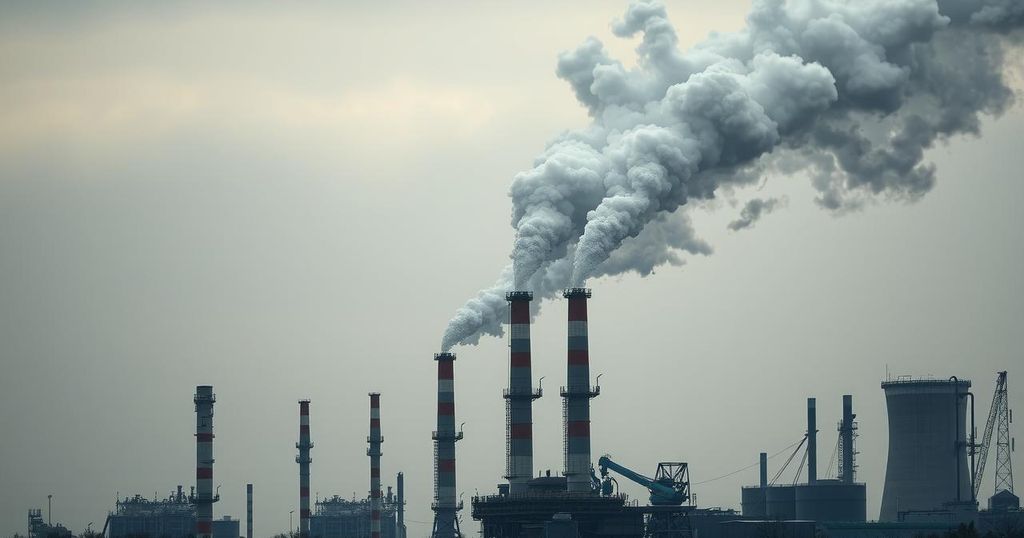Pollution Crisis: Ghana, Nigeria, Chad, and Rwanda Among Most Polluted Countries

The 2024 World Air Quality Report highlights the grave air pollution crisis in Africa, with Ghana, Nigeria, Chad, and Rwanda ranking among the most polluted countries worldwide. PM2.5 levels significantly exceed WHO guidelines, leading to severe health consequences and alarming mortality rates. Immediate action is urged to mitigate this pressing public health emergency and enhance air quality monitoring initiatives.
The 2024 World Air Quality Report has disclosed alarming levels of air pollution in Africa, particularly in countries such as Ghana, Nigeria, Chad, and Rwanda, which are among the most polluted globally. This report underscores a critical air quality crisis jeopardizing millions of lives across the continent.
Chad ranks as the most polluted country, exhibiting a PM2.5 concentration of 91.8 µg/m³, significantly exceeding the World Health Organization’s (WHO) recommended limit of 5 µg/m³. Nigeria, with a PM2.5 level of 40.1 µg/m³, is ranked 11th, while Rwanda is placed 9th with 40.8 µg/m³. Ghana follows closely at 14th position with a level of 35.8 µg/m³.
The PM2.5 particles are particularly hazardous as they can penetrate deep into the lungs and bloodstream, leading to serious respiratory and cardiovascular conditions. These tiny pollutants are significantly smaller than typical dust particles, rendering them nearly invisible but extremely toxic.
According to data from the University of Chicago’s Air Quality Life Index (AQLI), air pollution has diminished longevity in severely affected areas by an average of 2.7 years. WHO estimated that in 2019, air pollution accounted for approximately 28,000 annual deaths in Ghana. Globally, pollution led to 8.1 million deaths in 2021, averaging to roughly 22,192 deaths daily.
Air quality in Ghana has drastically worsened, being reported as seven times higher than the WHO safety limit. The capital city, Accra, was ranked 16th globally among polluted capitals with an annual PM2.5 level of 36.3 µg/m³, while Kumasi, for the first time included in the report, recorded an even higher metric of 39.5 µg/m³.
Ghana’s pollution levels have escalated in recent years. In 2022, it was positioned at 27th with a PM2.5 level of 30.2 µg/m³, which increased to 17th place in 2023, with 33.2 µg/m³, and further up to 14th place in 2024 with a record 35.8 µg/m³.
The air quality crisis is not uniquely Ghanaian; Africa faces a broader struggle with severe pollution levels and inadequate air quality assessment systems. The 2024 report reveals that five of the top ten most polluted countries are in Africa, and only 24 out of 54 African nations have reported air quality data.
Inaccurate data severely hampers efforts to tackle air pollution, with major urban areas such as Lagos lacking sufficient reporting. Air pollution has emerged as a public health emergency in Ghana; with WHO data suggesting a death occurs every 19 minutes from toxic air exposure.
The alarming rise in pollution levels signifies a strong need for immediate action. Ghana’s leap from the 27th to the 14th most polluted country within two years indicates an urgent need for effective policies.
While only 17% of cities globally meet the WHO air quality standards, regions with significantly cleaner air still exist. In 2024, Chad, Bangladesh, and Pakistan lead as the worst-polluted nations, while countries like Australia and New Zealand have successfully maintained clean air status.
Factors contributing to the air pollution crisis include heightened urbanization, population growth, and industrial emissions. As the NGO sector plays a vital role in providing air quality data, governmental monitoring efforts require significant strengthening.
The pressure is mounting for Ghana to develop and enforce stringent environmental regulations. Experts advocate for enhanced vehicle emission standards, investment in renewable energy, and expanded air quality monitoring networks, stressing that without prompt action, the air quality crisis will likely worsen.
In conclusion, the 2024 World Air Quality Report highlights the grave air pollution situation in Ghana and other African nations, notably Chad, Nigeria, and Rwanda. The alarming PM2.5 levels indicate a critical public health crisis, with dire implications for mortality rates. Addressing the pressing need for more rigorous pollution control measures and enhanced air quality monitoring is imperative to safeguard public health and economic stability in the affected regions.
Original Source: www.myjoyonline.com






